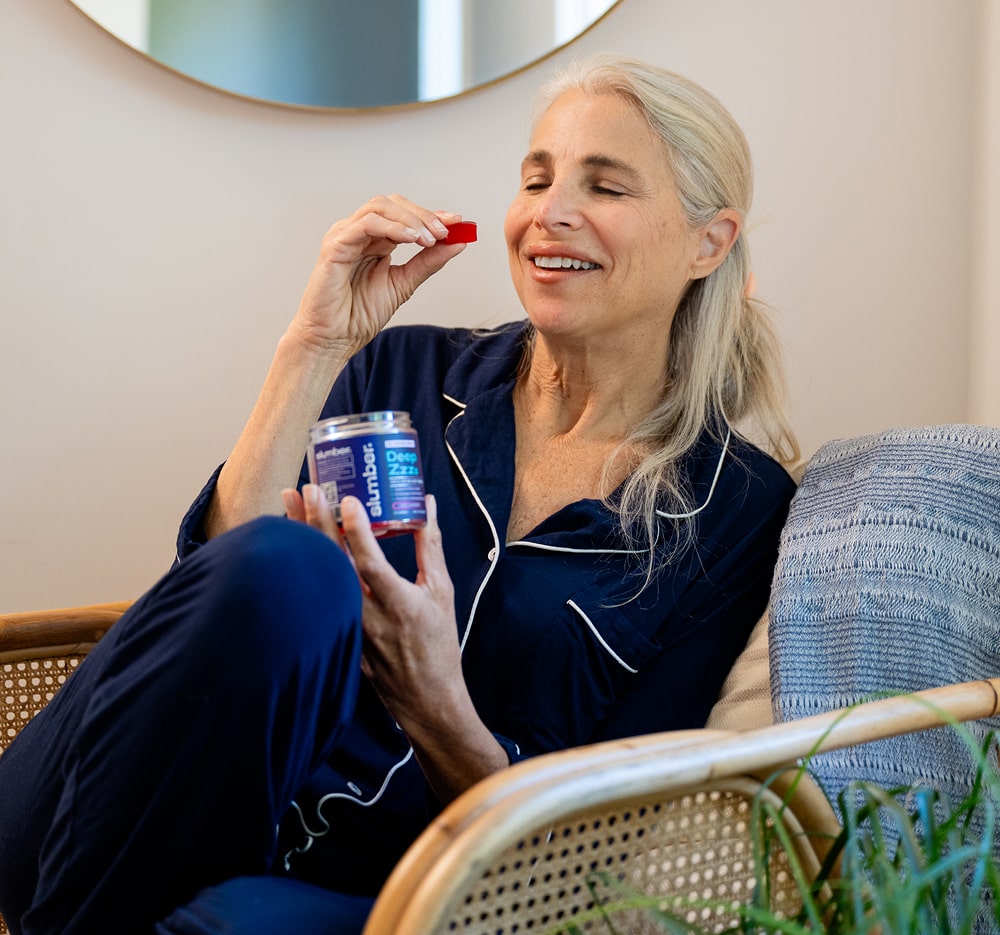Tossing and turning at night is a struggle many know all too well. In one study, insomnia affected one-third of adults sampled, which makes it a common issue that many adults around the world are experiencing. Our guide to insomnia is meant to be a resource for anyone who is interested in the topic or potentially even struggling with insomnia themselves. Slumber is committed to sleep-based education and since insomnia affects so many people, it is especially important to understand insomnia, its causes, symptoms, side effects, and treatments that are available. So let’s dive in.
Key Takeaways
- If you're having trouble sleeping, can't stay asleep, or feel tired after a night's sleep, you might have insomnia. Insomnia can affect how you think and act during the day.
- Stress, health problems like chronic pain or diabetes, and bad sleep routine habits can contribute negatively to sleeplessness.
- Doctors may use medical checks, sleep studies, or request sleep diaries to better understand whether insomnia is occurring in patients. They look at your health history and might test things like stress hormones in your body, but since insomnia is not a disease, there is no official test to diagnose it.
- There are many ways to treat insomnia. Some people may need medication in tandem with sleep routine habits to overcome insomnia.
Understanding Insomnia
Understanding Insomnia entails delving into its definition, various forms, and the extent to which it affects individuals' daily lives. Insomnia is not merely occasional sleeplessness; it comes in different types, acute or chronic, significantly impacting one's overall health and daytime functioning. Some of the telltale signs that you may need to see a doctor as a result of insomnia is if you are noticing sleeplessness having an impact on your daily ability to accomplish tasks, experience chronic fatigue, are struggling with depression, or if you’re making uncharacteristic mistakes in your daily life as a result of lack of sleep. Often times it can be difficult to assess whether these may be true for you, so if you have a partner, close friend, family member, or someone who spends time with you on a regular basis then you may ask them to keep a journal, log, or record of things they observe in your behavior that might be related to insomnia. This can be very helpful context for any doctor you visit to better understand if insomnia is affecting you.
Knowing how widespread this condition is can shed light on its societal relevance and the importance of addressing it through proper channels.
Definition and Types of Insomnia
According to the Mayo Clinic, insomnia is a sleep disorder resulting in difficulty falling asleep or staying asleep. Insomnia also includes waking up too early and not being able to get back to sleep. When this trouble sleeping leads to feeling tired during the day, it may be insomnia. Insomnia can occur both on the short and long term, which is referred to as acute or chronic insomnia respectively.
Two main kinds of insomnia exist: acute and chronic. Acute insomnia is short, maybe for a few nights or weeks. Chronic insomnia lasts for three months or more.
Different types cause different sleep problems. Some people can't sleep well because they struggle with anxiety, a restless mind, or have pain in their bodies that keeps them awake. Others might have bad habits like looking at phones before bed which essentially tricks your brain into thinking it’s daytime and may cause issues when your body is trying to enter into a restful state. In other words, looking at your phone before bed can delay your ability to fall asleep and may negatively affect symptoms of insomnia.
Insomnia can affect anyone, but some folks might have a higher chance of getting it due to stress or changes in their life. The Center for Disease Control publishes sleep deprivation statistics, which show that sleeplessness can affect anyone 18 and older. Specifically though, the CDC reports that women are much more likely to be impacted by sleeplessness. One contributing factor as to why women struggle more than men could be the increased responsibilities placed on working mothers to maintain full-time employment while also shouldering many household responsibilities.
Prevalence and Impact on Daily Life
Inherently, insomnia is especially prevalent in individuals who experience challenges in their daily life as a result of lack of sleep.With nearly one third of the population experiencing insomnia, this sleep disorder is affecting a lot of us in ways we may or may not notice. This issue has more significant outcomes than sleep deprivation; it changes how well you think, feel, and interact with others during the day.
According to a sleep expert at NIH, sleep affects “nearly every tissue in your body,” so it is no wonder that our everyday lives are so impacted by our sleep quality. Anecdotally, a lot of us can probably think of times when we were well-rested and the ways in which our daily lives may have been improved as a result. For example, perhaps you have gotten 7-8 hours of sleep per night before a very important event, meeting, or occasion in your life. Because of your consistent sleep, your body is in a better position to manage stress levels. So you may notice that you feel more at ease and less stressed than if you had only gotten 4-5 hours of sleep per night.
Recognizing Insomnia Symptoms
Difficulty falling asleep, frequent awakenings during the night, and experiencing unrefreshing sleep are common symptoms of insomnia. These symptoms often lead to daytime fatigue, mood disturbances, and a decline in performance at work or school, highlighting the importance of addressing sleep issues for overall health and well-being.
Common Signs of Insomnia
Insomnia can show itself in different ways. Here are some signs to look out for:
- Lying awake for a long time before falling asleep
- Waking up many times during the night
- Having trouble going back to sleep after waking up
- Feeling tired even after a night's sleep
- Waking up too early and not being able to sleep again
- Not feeling well - rested after waking up in the morning
- Feeling sleepy or tired during the day
- Getting cranky, anxious, or depressed easily
- Finding it hard to pay attention, focus on tasks, or remember things
- Making more mistakes or having accidents than usual
How Insomnia Affects Health and Well-being
Lack of sleep can have significant impacts on areas of your health and life that can be noticeable. Think about a time when you have felt exhausted and life also demanded that you overcome that sleeplessness to accomplish any task. Parents can relate to this scenario. The point here is that lack of sleep causes so many issues that are front and center for us and our daily interactions with others that it pays to prioritize sleep as one of your top health and wellness priorities. Not sleeping well can cause cognitive decline, memory lapses, and also impact your mental health. Your thoughts might get fuzzy, and you could have a hard time handling and processing your feelings in a constructive way.
If you don't get enough good sleep, your body can suffer, too. You might feel really tired during the day and not as ready to fight off sicknesses. Diseases like heart problems, obesity, high blood pressure, diabetes, and even cancer are all linked to chronic insomnia. Also, routines such as going to the gym, being active, or being social can suffer as a result of sleeplessness. So if you’re moving your body less, are less active, and less social, one can imagine the holistic effects that lack of sleep can cause on someone.
Sleep is a top priority for maintaining a healthy, connected, and productive lifestyle.
Exploring the Causes of Insomnia
Understanding the multifaceted origins of insomnia is crucial, as both psychological factors, like stress and depression, and physical conditions such as chronic pain or restless legs syndrome can disrupt sleep.
Lifestyle choices and environmental triggers, ranging from poor sleep hygiene to excessive noise or light exposure, also play significant roles in the onset of this disorder. Identifying these causes is a fundamental step toward tailoring effective treatment strategies for those struggling with difficulty sleeping. That to say, it’s important to examine aspects of your sleep routines and surroundings with careful consideration and attention to what may be affecting your sleep. Sometimes having a 3rd party help you can also be beneficial as people with a fresh perspective might be able to offer suggestions on ways to help your body enter into a restful state by optimizing your surroundings and lifestyle for great sleep each and every day.
Psychological Factors
Anxiety is a significant factor that causes sleeplessness and insomnia. Humans are working longer hours than ever before, and our professional lives can be a major source of anxiety. It’s common to hear others complain about work and expectations placed on them or dynamics they are left to deal with. A racing mind and anxiousness can absolutely breed sleeplessness which can ultimately lead to insomnia. Your thoughts and feelings play a large role in how well you sleep and allowing yourself to be calm, relaxed, and have a settled mind is critical for sleep health.
You might also stay awake because of mental health issues such as depression or anxiety disorders. The prevalence of depression in American society is staggering with 18.5% of adults experiencing depression in their own lives. Nearly 1 out of every 5 people you meet has struggled with depression and the side effects can be debilitating for your sleep schedule. Depression is a complex issue that requires medical oversight and input from experienced professionals, and if you are experiencing depression now we highly encourage you to consult a medical professional. If your depression is leading to suicidal thoughts then please call 9-8-8
Bad moods can change the balance of chemicals in your brain, making it harder to fall asleep or stay sleeping. Experts call this hyperarousal, and it's like your brain is too switched on to rest properly.
Let's look next at physical conditions and how they affect our sleep too.
Physical Conditions and Lifestyle Influences
Besides the mind's role in insomnia, your body and how you live each day also play a part. Many physical conditions can make it hard to sleep well. For example, health problems like diabetes or heart disease can disrupt sleep as well as chronic pain or discomfort.
Pain from injuries or conditions like arthritis are common physical ailments and conditions that can lead to sleeplessness. What’s interesting is that products containing cannabinoids may help reduce symptoms of arthritis which can lead to better sleep. In the Slumber sleep study, participants ingested a Deep Zzzs sleep gummy which led to an overall reduction in symptoms of arthritis and an increase in sleep by 72 minutes per night on average. While more studies need to be done in the United States to corroborate the efficacy of cannabinoids and THC, Slumber’s study is very encouraging.
Your lifestyle choices have power over your sleep as well. If you drink coffee or smoke before bed, falling asleep might be tough. Those who do shift work or travel a lot could find their sleep schedule thrown off track.
Regular exercise can positively impact your sleep, but working out right before bedtime may not help. It helps to watch what you do during the day so that when it's time for bed, your body is ready to rest. Generally speaking, if your exercise routine is at least one hour before bed and moderate in its intensity then you should not experience too many averse effects. However, more strenuous exercise before bed can cause sleep disruption, according to Harvard.
Environmental Triggers
Certain things around us can make it hard to sleep. For example, too much light or noise in your bedroom can keep you awake. Even small things like pets moving or electronics blinking might disturb your sleep. While it is aspirational, sound deprivation can be a great method for trying to improve your sleep. The quieter the environment the better your chances may be at getting a good night’s sleep. However, noise and light pollution can negatively affect your sleep.
If the room is too hot or cold, that also makes sleeping tough. There is some interesting research regarding the benefits of sleeping nude, which can be a way for you to regulate your body’s temperature and enter into sleep mode a little easier. Too many layers of clothing or blankets could have the opposite effect.
Some habits before bed can hurt your sleep too. Drinking coffee or soda late in the day gives you energy through caffeine which is a challenger to your brain’s rest mode. Smoking and alcohol may feel relaxing but actually lead to bad sleep later at night because of an increase in blood pressure, for example.
It’s best to create a calm space for sleep and stick to routines that help your body know it's time to rest.
Moving on from what surrounds us and triggers insomnia, let's consider the risk factors tied to who we are — our age, gender, stress levels, and mental health all play a role in whether we might struggle with sleeping well.
Identifying Risk Factors for Insomnia

Understanding the risk factors associated with insomnia is crucial for both prevention and targeted treatment. Certain demographics, including older adults and females, are more prone to experience sleep disturbances.
Psychological stressors and mental health conditions such as anxiety or depression frequently correlate with increased incidences of insomnia. A thorough evaluation of an individual's risk profile can guide effective interventions and promote better sleep outcomes.
Age and Gender Considerations
Insomnia hits some people more than others. Women often find it harder to fall asleep or stay asleep compared to men. In fact, almost half of all women might struggle with insomnia at some point in their lives.
Older adults also have a bigger chance of facing chronic insomnia. According to the CDC, the most impacted age group is 45 - 64 with 65+ being the next largest group impacted by sleeplessness.
Stress and mental health can play big roles in sleep problems too. Folks who feel lots of stress or have mind troubles like depression may lie awake at night often. Next up, let’s look into how doctors figure out if someone has insomnia.
Stress and Mental Health Correlations
Feelings of stress often make it hard to sleep. Our bodies may stay alert because the brain keeps thinking about worries. This can lead to trouble falling asleep or waking up a lot in the night.
Mental health issues like depression and anxiety are closely linked with sleep problems, too. These health problems might make our brain's stress system work too much, causing more cortisol, a stress hormone, to be made.
Sleep troubles can get worse because of these mental health issues. It's important for people who can't sleep well to check if they also feel very sad or worried. Getting help for these feelings might improve their sleep as well.
Now that we understand how stress impacts insomnia, let's discuss how doctors figure out if someone has this sleep issue.
Can Insomnia be Diagnosed?
Determining the presence of insomnia typically involves a thorough medical evaluation, possibly accompanied by sleep studies; importantly, patients might also be asked to keep a detailed sleep diary to track patterns and irregularities in their sleep behavior. But because insomnia is not a disease, there is not a certified way to diagnose a disorder.
Medical Evaluation and Sleep Studies
Getting the right diagnosis for sleep issues is important. Doctors use sleep studies and medical evaluations to find out what's causing trouble sleeping.
- Visit a doctor*: Share your sleep problems with them. Tell them about how long it takes to fall asleep, if you wake up at night, or if you feel tired during the day.
- Talk about your health*: Let the doctor know about any sicknesses or medicines that might be making it hard to sleep.
- Sleep study testing*: A special test called a "sleep study" might be needed. You'll spend the night at a clinic where experts watch your sleep.
- Wear an actigraphy watch*: This is like a fitness tracker. It measures how much you move and can tell when you're asleep or awake.
- Keep a sleep diary*: Write down when you go to bed, when you wake up, and anything that seems to disturb your sleep.
- Blood tests may happen*: These check for things in your body that could be messing up your sleep.
- Actigraphy tests are useful*: They help figure out patterns in how you sleep over weeks.
- Check cortisol levels: High levels of this stress hormone can mean that stress is part of the insomnia problem.
- Look at catecholamine levels*: These chemicals in the body can also affect sleep and may get checked through urine tests.
The Role of Sleep Diaries in Diagnosis
After your doctor looks at your sleep habits and medical history, you might be asked to keep a sleep diary. Sleep diaries are important because they help show how long you sleep and what you do that might affect your sleep. The more detailed you can keep your sleep diary, the more helpful that diary will be in pursuit of the best sleep possible. Try your best to log details about activities done before bed, when your phone was out of sight, any caloric intake before bedtime, and other important details.
Every day, for one or two weeks, write down when you go to bed, when you wake up, and a short entry about the details surrounding your sleep routine. This will be a great start for better understanding your sleep routines. After understanding them, you can then make improvements and optimizations to your surroundings which can lead to better sleep.
Your records can help find patterns in your insomnia. They give doctors clues about what's causing trouble with your sleep. With this information, the doctor can suggest the best way to help you get better rest.
Treatment Options for Insomnia
Treatment options for insomnia vary and often include Cognitive Behavioral Therapy (CBT-I), which targets the thoughts and behaviors contributing to sleep disturbances. Prescription medications like hypnotics can be effective but require careful management due to potential side effects. It is always important to consult your healthcare provider and medical professionals for any therapeutic or medication recommendations.
Over-the-counter remedies, such as melatonin supplements, are also available, while homeopathic treatments offer a more natural approach. Somewhere in the middle exists plant-based sleep aids such as CBD, CBN, THC, and combining cannabinoids to produce calm, relaxed, and restful mental states. Tailoring treatment to the individual's needs is critical for success in managing this sleep disorder.
Cognitive Behavioral Therapy (CBT-I)
Cognitive Behavioral Therapy for Insomnia is a special kind of help for people who can't sleep well. It works on changing the bad thoughts and actions that keep you awake. You learn how to calm your mind and set up good sleep habits. Online-therapy.com is a great resource to consider for CBT therapy.
This therapy has helped many get better at thinking and feeling less upset which allows for a more calm mind and can lead to better sleep.
Doctors say it's the best first step if you have long-term sleep troubles. CBT-I helps you get your sleep-wake cycle on track and find ways to relax so you can fall asleep easier. If counting sheep isn't helping, this therapy could be what you need to finally get some rest.
Next, let's talk about prescription sleep medications and their role in treating insomnia.
Prescription Sleep Medications

While Cognitive Behavioral Therapy for Insomnia (CBT-I) is a preferred treatment, some people might need extra help. This is where prescription sleep medications come in. Doctors sometimes prescribe sleeping pills for a short time to help you fall asleep or stay asleep.
Medicines like Ambien or Lunesta can be useful, but it's important not to use them for too long because you could become dependent on them.
There are different types of drugs for sleep problems, and they work in unique ways. For example, some may change chemicals in your brain that affect your sleep-wake cycle. Others might make you feel relaxed so that falling asleep becomes easier.
Remember to only take these medicines when a doctor tells you to because they can have side effects and shouldn't be mixed with certain other drugs or alcohol.
Over-the-Counter and Homeopathic Remedies
Many people with sleep problems try over-the-counter (OTC) and homeopathic remedies. Products like melatonin can help reset the body’s clock and make it easier to fall asleep. There's also a wide range of natural sleep aids, from herbs to dietary supplements, such as CBD gummies for sleep.
But even if you can buy these without a doctor's note, it's smart to talk about them with your healthcare provider first.
These options are often for short-term use. They might help when stress or travel messes up your sleep schedule. It is important to follow directions on how much and when to take them, because taking too much or using them for too long could cause other health issues.
Always check in with a professional before starting any new remedy for your sleep troubles.
Lifestyle Modifications to Improve Sleep
Implementing healthy sleep hygiene practices can be transformative, from establishing a regular bedtime routine to optimizing your bedroom environment for restfulness. Engaging in physical activity and moderating dietary choices also play crucial roles in enhancing sleep quality, while relaxation techniques effectively manage stress that often hinders slumber.
Dive deeper into our guide for actionable steps towards reclaiming rejuvenating nights of sleep.
Sleep Hygiene Practices
Good sleep hygiene can help you beat insomnia. These practices improve your sleep quality and help you feel better.
- Keep a regular sleep schedule: Go to bed and wake up at the same time every day, even on weekends.
- Create a bedtime routine: Do the same relaxing activities every night before bed so your body knows it's time to wind down.
- Make your bedroom sleep-friendly: Use comfortable bedding and keep the room dark, quiet, and cool.
- Avoid naps during the day: If you need to nap, keep it short—no more than 20 minutes.
- Limit caffeine and alcohol: Both can disrupt your sleep, so avoid them in the hours before bedtime.
- Turn off screens before bed: The light from phones, tablets, and TVs can keep you awake.
- Get out of bed if you can't sleep: If you're lying awake for more than 20 minutes, do something calming like reading until you feel sleepy again.
- Exercise regularly but not right before bed: Physical activity can promote better sleep but try to finish any vigorous exercise several hours before bedtime.
- Manage stress: Learn relaxation techniques such as deep breathing or meditation to help calm your mind at night.
- Eat light before bedtime: A heavy meal can lead to discomfort and make it harder to fall asleep.
Diet and Exercise Impacts on Sleep
Eating healthy and staying active are key for good sleep. Certain foods and exercises can help you fall asleep faster and sleep better. For example, eating less sugar can keep your heart rate normal at night. There are even foods to help you sleep, according to Cleveland Clinic.
A calm heart helps you rest well.
Getting regular exercise during the day makes you tired in a good way. It's best not to work out too close to bedtime though, or it could wake up your body instead of calming it down.
Make small changes like walking more or choosing better snacks if you want to see how diet and exercise affect your sleep.Remember, consistency is important. Try to stick with these healthy habits every day, and soon you might notice that falling asleep isn't as hard as it used to be!
Relaxation Techniques and Stress Management
Stress and worry can keep you awake at night. To sleep better, try some relaxation methods. Deep breathing is a good place to start. Inhale slowly, then exhale slowly. This can calm your mind and body. As you inhale, think to yourself “I know I am breathing in.” As you exhale, think to yourself, “I know I am breathing out.” Repeat this cycle for a more meditative practice and way to calm the body and mind.
Another way is progressive muscle relaxation; tense each muscle for a few seconds, then let go. Do this from head to toe and you can even try to do multiple sets of this practice. For some, this helps to reduce tension in the muscles and can help the body relax.
You could also use visualization or guided imagery. Picture yourself in a peaceful place like a beach or forest to help relax your thoughts before bed. These techniques might take practice but they can ease stress and improve your sleep over time.
Remember, it's important to make these part of your everyday routine for the best results in managing insomnia.
The Role of Technology in Insomnia Treatment
The integration of technology into insomnia treatment has introduced innovative tools such as sleep tracking apps and light therapy devices, offering new methods for individuals to manage their sleep patterns and improve overall sleep quality.
These technological advancements are designed to assist in creating a tailored approach to treating insomnia by providing insights into one's sleeping habits and potential disruptions, thereby enabling users to make informed decisions about their sleep health.
Sleep Tracking and Apps
Sleep tracking apps are tools that can help you understand your sleep patterns. Apps like Fitbit, Apple Health, and Sleep Cycle look at how you sleep each night. They show when you fall asleep, wake up, and how deep your sleep is. This information helps doctors figure out the best way to treat your insomnia.
Using these apps may make it easier for you to spot changes in your sleep over time. They also offer tips on improving your rest. Remembering to use them every night can give valuable data that might lead to better sleep health.
Light Therapy Devices
Light therapy devices are tools that can help fix your sleep patterns. These devices shine light similar to sunlight. This light can influence the body's internal clock, also known as circadian rhythm. Many people with sleep problems find these tools helpful, especially if they have trouble because their natural body rhythms are off. Some folks might use them during winter or when they don't get enough daylight.
Doctors often suggest using light therapy along with other treatments for better sleep. They say it's safe and simple to use since you don't have to put anything into your body like medicine. It is a good choice for those who need an extra push to get their sleep back on track without using drugs that might have side effects.
When to Seek Professional Help
If frequent nighttime awakenings, severe daytime fatigue, or other symptoms of insomnia persist despite self-management efforts, it's crucial to consult a sleep specialist or medical professional who can provide targeted treatment and address potential underlying health issues.
Warning Signs for Serious Sleep Disorders
Sleep problems can affect anyone, and some signs might suggest a more serious sleep disorder. It's key to notice these early and talk to a doctor.
- You have trouble sleeping even though you are very tired. Your body wants to rest, but you just can't fall asleep or stay asleep.
- Daytime sleepiness is strong and makes doing your daily tasks hard. Feeling sleepy all the time can make work and driving dangerous.
- Waking up gasping or feeling like you're choking could be a sign of sleep apnea. This is when your breathing stops for short times during sleep.
- Often feeling moody or irritable could mean your body is not getting the rest it needs. Lack of sleep can make you feel angry or sad without a clear reason.
- Your legs or arms twitch and kick while you're sleeping. These movements can mess with your sleep and may point to a disorder called periodic limb movement disorders (PLMD).
- You wake up often during the night and then have trouble going back to sleep. This pattern can hurt your health over time.
- Bad dreams or nightmares happen often and scare you awake. If this keeps happening, it may be more than just a bad dream now and then.
- Falling asleep at random times during the day, even if for short periods, isn't normal. This could mean you have narcolepsy or another issue affecting your sleep cycle.
The Importance of Consulting a Sleep Specialist
If you're facing serious sleep problems, a sleep specialist can be a big help. They know a lot about different sleep issues like insomnia. These doctors study sleep medicine and understand how to treat problems that stop you from sleeping well. A sleep specialist checks your health and looks for things that could be causing your trouble with sleeping. They might use tools like sleep studies to find out more about what's going on when you try to rest.
Talking with one of these experts is important if nothing else has helped you get better sleep. They offer treatments that are not just medicine, like cognitive behavioral therapy for insomnia (CBT-I), which teaches new ways to think and act to improve your bedtime habits.
Insomnia in Special Populations
Understanding insomnia's unique impact on special populations is crucial, as conditions like pregnancy and age-related health changes demand tailored approaches to diagnosis and treatment.
Chronic health issues may also intensify or complicate the management of insomnia, necessitating specialized care strategies to ensure individuals receive optimal support for their specific sleep challenges.
Insomnia During Pregnancy
Pregnant women often find it hard to sleep well. Their bodies change, and they may feel anxious or uncomfortable physically as a result of the shifts in hormones and physiological changes occurring in the body. This can lead to insomnia. Hormones also play a big part in disturbing sleep for expecting moms.
It's important for pregnant women to talk with their doctors about any trouble sleeping. Getting good rest is key for the health of both the mom and her baby. If a pregnant woman is not sleeping enough, she might face more risks during birth and afterwards. She should ask for safe ways to improve her sleep while pregnant.
Next up, let's consider how age affects our sleep patterns over time.
Age-Related Insomnia Concerns
Just as pregnancy can change sleep patterns, getting older also affects how we sleep. Older adults often find it harder to fall asleep and stay asleep. They might wake up early and not be able to go back to sleep. Their bodies may not feel as rested after sleeping.
Sleep problems in older adults are important because they can lead to falls or confusion. Poor sleep also makes it hard for them to do everyday tasks. Good rest helps keep minds sharp and mood steady. It is key for older folks to speak with doctors about any sleep troubles so they can enjoy better health and live life fully.
Insomnia and Chronic Health Conditions
Getting older can change sleep patterns, but chronic health issues also play a big role in insomnia. Long-term lack of sleep can lead to serious problems like obesity, heart disease, and diabetes.
People who don't get enough rest may even find themselves facing mood disorders such as depression and anxiety. Sadly, these mental health troubles can make it harder for them to fall asleep or stay asleep.
Sleep loss isn't just about feeling tired the next day; it affects your whole body over time. If someone already has a medical condition, not sleeping well can make it worse. For example, those with chronic conditions often have trouble sleeping because of pain or discomfort at night.
That's why good sleep is super important for keeping both mind and body healthy.
Preventing Insomnia
Developing strategies for reducing the risk of insomnia is essential, focusing on early intervention and the adoption of healthy sleep practices. Implementing a consistent bedtime routine, creating an optimal sleep environment free from disruptions, and engaging in regular physical activity are pivotal steps toward prevention. Additionally, managing stress through mindfulness or therapy can help mitigate factors that commonly precipitate insomnia. Educating individuals about the importance of sleep hygiene and its role in preventing sleep disturbances empowers them to take charge of their sleep health before issues arise.
Strategies for Reducing the Risk of Insomnia
Getting a good night's sleep can be tough for some people. Insomnia makes it hard, but there are ways to lower the risk.
- Create a sleep schedule: Go to bed and wake up at the same time every day, even on weekends. This helps set your body's internal clock.
- Make bedtime rituals: Do relaxing things before bed, like reading or taking a warm bath. Stay away from exciting activities.
- Keep your sleep space comfy: Make sure your bedroom is quiet, dark, and not too hot or cold.
- Choose a good mattress and pillows: Your bed should be comfortable and supportive for the best sleep possible.
- Power down screens earlier: Turn off TVs, computers, and phones at least an hour before bed because the light can keep you awake.
- Be active during the day: Regular exercise can help you fall asleep faster and enjoy deeper sleep—just not right before bedtime.
- Watch what you eat and drink: Don't go to bed hungry or stuffed. Avoid heavy meals late at night. Limit caffeine and alcohol close to bedtime.
- Nix naps if necessary: Long daytime naps can steal sleep from nighttime. If you nap, keep it short—around 20 minutes—and not too late in the day.
- Manage stress: Try to resolve worries or concerns before bedtime by writing them down or thinking of solutions ahead of time.
Importance of Early Intervention
Cutting down the risk of insomnia is a big step, but acting fast when sleep issues start is key. Early help for insomnia stops worse health problems from happening. If you catch it soon, you can keep your body healthy and avoid things like heart disease or diabetes that come from not sleeping well. Getting ahead of insomnia also means less chance of it leading to sad feelings or other mind troubles. Start working on better sleep as soon as you can!
Conclusion
Our journey through the complexities of insomnia underscores the importance of recognizing its signs, understanding its causes, and adopting appropriate treatment modalities for improved sleep health and overall well-being.
Insomnia makes it hard to sleep, leaving you tired and lacking energy during the day. Many people deal with this problem, and it can hurt your work, school, or social life. If you're feeling worn out all the time, find it hard to focus or get easily upset, these could be signs of insomnia.
Your body's health might also suffer without enough sleep. You could face bigger risks for weight gain, sugar issues like diabetes, and even heart troubles.
Treating insomnia is important to feel better overall. One of the best ways to fix sleep problems is through cognitive behavioral therapy for insomnia (CBTi). This kind of treatment helps you change thoughts and habits that mess up your sleep.
Taking charge of your sleep health is a vital step towards feeling better. It's important to tackle the things that can cause poor sleep before they become bigger problems. For starters, look at where you sleep.
Make sure your bedroom is quiet and dark. Keep it at a comfy temperature for sleeping too.
Think about what you do before bed as well. Try to relax and wind down with activities like reading or taking a warm bath. Stay away from screens like phones and TVs right before bedtime; the light can make it hard to fall asleep.
Good habits during the day matter too. Eating well, staying active, and getting outside in natural light all help you have better nights of rest.
If stress keeps you up, consider ways to manage it, like yoga or talking to someone about your worries. If these steps don't help enough, cognitive behavioral therapy might be a next good move; many find it really helps with insomnia.
Remember that if sleeping troubles stick around or get worse, see a doctor who specializes in sleep issues—they're there to help! They might suggest different treatments after finding out more about what's causing your insomnia.
By facing sleep issues head-on and changing some daily habits, better rest could be just around the corner!



















Leave a comment
This site is protected by hCaptcha and the hCaptcha Privacy Policy and Terms of Service apply.